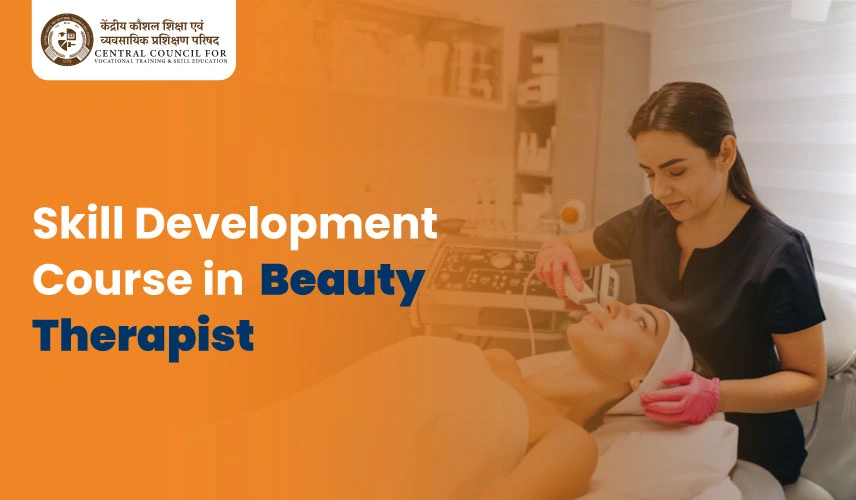- +91 8595350621
- info@ccvte.org
- C4/97B, Keshav Puram, Delhi-110035
Beauty Therapist

Skill Development Program in Beauty Therapist
A beauty therapist is a professionally trained expert in face and body care. They may be certified to provide a variety of treatments or choose to specialize in specific areas such as massage, facials, or waxing. Regardless of the treatments they offer, a beauty therapist must thoroughly understand how each treatment affects the skin and body, including in-depth knowledge of the products they use, such as lotions and waxes. A beauty therapist is a versatile professional who plays a crucial role in enhancing clients' physical appearance and overall well-being. Their expertise, dedication to continuous learning, and commitment to excellent customer service make them valuable assets in the beauty and wellness industry. Beauty therapy is a multifaceted profession that combines art, science, and personal care to enhance the appearance and well-being of clients. Beauty therapists are skilled practitioners trained to provide a wide range of treatments, including skincare, makeup application, nail care, and body treatments. Their expertise helps clients look and feel their best, boosting their confidence and promoting overall wellness. A beauty therapist's role goes beyond just enhancing physical appearance. They also play a crucial part in promoting relaxation and mental well-being. By offering treatments such as facials, massages, and body wraps, beauty therapists help clients unwind and de-stress, contributing to their overall health.
Why did you choose the Beauty Therapist course from CCVTE?
- A skill development course in Beauty Therapy is specially designed for students aiming for a career in the beauty and wellness industry.
- The course provides practical skills and knowledge required in the field and is approved by esteemed bodies.
- Upon completion, students can find work opportunities in beauty salons, spas, wellness centers, and even freelance settings.
- Key highlights of the course include its flexibility and affordability, allowing students to complete it more quickly and at a lower cost compared to traditional full-time degree programs.
- The curriculum includes Skincare, Makeup Artistry, and Beauty Care, covering essential topics such as skin care techniques, makeup application, and body therapies.
- This comprehensive training offers a practical, cost-effective pathway to a rewarding career in beauty therapy.
Specializations in Beauty Therapist
- Nail technician
- Lash and brow technician
- Make-up artist
- Waxing technician
- Generalized spa and salon beauty therapist
- Facialist
- Skin needling technician
- Microblading artist
- Eyebrow threading specialist
- Speciality lash technician
- Electrolysis hair removal specialist
Career Opportunities
The beauty therapy industry offers diverse and dynamic career opportunities, allowing professionals to specialize in areas that match their interests and talents. Whether you prefer working in a salon, spa, clinic, or independently, the skills and expertise gained from a beauty therapy course can lead to a rewarding and fulfilling career.
- Beauty Salon Professional
- Spa Therapist
- Skincare Specialist
- Makeup Artist
- Nail Technician
- Massage Therapist
- Hair Removal Specialist
- Cosmetic Tattooist
- Aromatherapist
- Beauty Consultant
- Educator/Trainer
- Salon Owner/Entrepreneur
Syllabus
|
3 Month |
6 Month |
1 Year |
2 Year |
|
Introduction to Beauty Therapy |
Introduction to Beauty Therapy |
Introduction to Beauty Therapy |
Introduction to Beauty Therapy |
|
Skincare Fundamentals |
Skincare Fundamentals |
Skincare Fundamentals |
Skincare Fundamentals |
|
Makeup Artistry |
Makeup Artistry |
Makeup Artistry |
Advanced Skincare Treatments |
|
Final Assessment and Certification |
Advanced Skincare Treatments |
Advanced Skincare Treatments |
Makeup Artistry |
|
Nail Care |
Advanced Nail Techniques |
Advanced Makeup Techniques |
|
|
Hair Removal Techniques |
Specialized Beauty Treatments |
Nail Care |
|
|
Salon Management and Client Care |
Body Treatments
|
Advanced Nail Techniques |
|
|
Final Assessment and Certification |
Massage Therapy
|
Hair Removal Techniques |
|
|
Electrotherapy Treatments |
Body Treatments |
||
|
Specialized Beauty Treatments |
Massage Therapy |
||
|
Salon Management and Client Care |
Advanced Massage Techniques |
||
|
Final Assessment and Certification |
Salon Management and Client Care |
||
|
Electrotherapy Treatments |
|||
|
Advanced Electrotherapy Techniques |
|||
|
Specialized Beauty Treatments |
|||
|
Final Assessment and Certification |
Top Hiring Opportunities for Beauty Therapist
- Beauty Salons
- Spas and Wellness Centers
- Dermatology Clinics and Medical Spas
- Cosmetic and Skincare Retailers
- Fitness Centers and Health Clubs
- Hotels and Resorts
- Film, Television, and Theatre Productions
- Bridal and Special Event Services
- Nail Salons
- Mobile Beauty Services
- Corporate Wellness Programs
- Educational Institutions
- Freelance and Entrepreneurial Ventures
Other Beauty & Wellness Courses Provided by CCVTE
Frequently Asked Questions
Choosing a Beauty Therapist course offers a path to a rewarding career in enhancing clients' appearance and well-being. It provides skills in skincare, makeup, and body treatments, with opportunities for specialization and entrepreneurship. The course also offers flexibility, creative expression, and the chance to work in diverse environments, from salons to spas.
To become a beauty therapist, you need a high school diploma or GED and completion of an accredited beauty therapy program. Most regions require certification or licensure, which involves passing an exam. Additional certifications in specialties like advanced skincare or makeup can enhance your qualifications and career opportunities, depending on local regulations and your career goals.
The duration of a Beauty Therapist course typically ranges from 6 to 12 months or 24 months depending on the program's intensity and whether you study full-time or part-time. Programs generally require between 300 and 600 hours of training, covering essential skills and techniques in skincare, makeup, and body treatments. Some advanced courses may take longer.
Career advancement for beauty therapists includes specializing in areas such as medical aesthetics, advanced skincare, or spa management. Opportunities include moving into salon or spa management, becoming a beauty educator, or starting your own business. Additional roles include freelance work for events and media or consulting for beauty brands and product development.
To build a successful client base as a new beauty therapist, focus on delivering exceptional service and building strong client relationships. Utilize social media to showcase your skills and offer promotions or discounts to attract new clients. Network with local businesses, ask satisfied clients for referrals, and participate in community events to increase your visibility and reputation.




